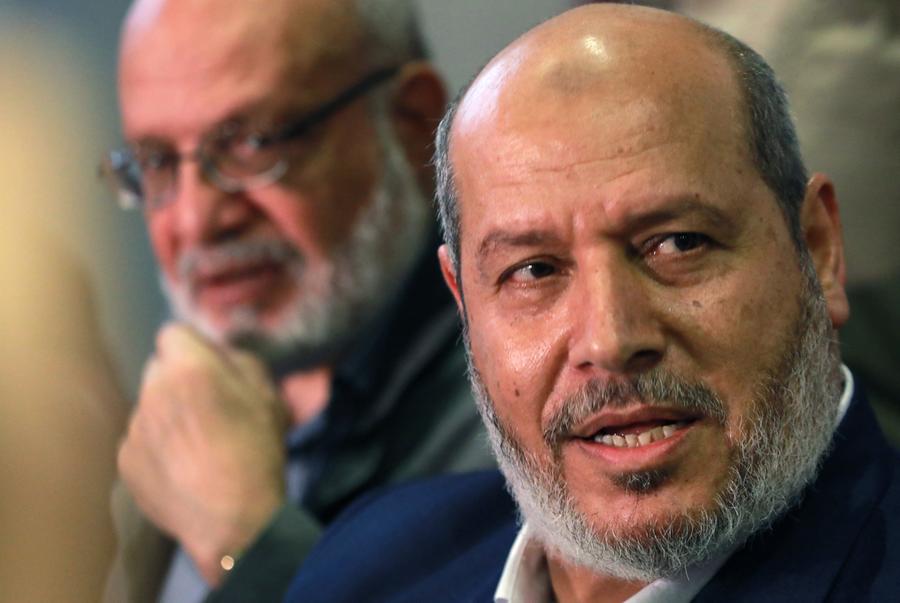Top Stories
Hamas Chief Declares Disarmament Conditional on Ending Occupation

URGENT UPDATE: Khalil al-Hayya, acting co-chair of Hamas’ political bureau, has just announced that the group will only disarm if the “occupation” ends, fundamentally challenging the framework of the US-backed peace deal. This declaration comes amid ongoing negotiations and raises critical questions about the future of peace in the region.
In an exclusive interview with Al Jazeera, al-Hayya stated, “The question of disarmament is linked to the presence of the occupation and aggression,” asserting that Hamas will not lay down its arms until the occupation ceases. This bold claim complicates the current peace talks, which are based on the Trump peace plan that stipulates Hamas must disarm after the final hostages are returned and only after the IDF withdraws from Gaza.
The definition of “occupation” remains contentious, with Hamas frequently asserting that Israel’s very existence constitutes an occupation. Al-Hayya’s comments diverge sharply from a recent statement by the Palestinian Authority’s largest party, Fatah, which has rejected the idea of a technocratic governing committee for Gaza, insisting that the PLO is the sole legitimate governing body for both the West Bank and Gaza.
In further developments, al-Hayya mentioned a purported agreement with rival Palestinian factions, including Fatah, to establish such a committee. However, he provided no specifics on when or how this would occur, nor did he clarify whether Hamas members would participate. The political landscape is increasingly fraught, with both Israel and the US firmly opposing Hamas’s role in any future governance.
Meanwhile, in a separate interview with the BBC, Jordan’s King Abdullah expressed skepticism about the proposed International Stabilisation Force (ISF) included in the Trump plan. Countries like Indonesia, Pakistan, and Azerbaijan are anticipated to contribute troops, but Israel demands veto power over any participating nation, particularly to prevent Turkish soldiers from being deployed—a scenario Prime Minister Netanyahu views as unacceptable.
King Abdullah questioned the effectiveness of a peacekeeping mission, commenting, “What is the mandate of security forces inside of Gaza? We hope that it is peacekeeping, because if it’s peace-enforcing, nobody will want to touch that.” He emphasized that while Jordan and Egypt are prepared to support training local police forces in Gaza, any armed patrols could deter international involvement.
As tensions escalate, the implications for peace in the region are becoming increasingly dire. The future remains uncertain, with critical negotiations ongoing and both sides firmly entrenched in their positions.
What’s Next: Observers will closely monitor any developments in the ongoing negotiations and the potential reactions from the international community, especially regarding the role of Hamas and the proposed ISF.
Stay updated for more breaking news on this evolving situation.
-

 Science2 weeks ago
Science2 weeks agoIROS 2025 to Showcase Cutting-Edge Robotics Innovations in China
-

 Politics2 weeks ago
Politics2 weeks agoJudge Considers Dismissal of Chelsea Housing Case Citing AI Flaws
-

 World2 weeks ago
World2 weeks agoBravo Company Veterans Honored with Bronze Medals After 56 Years
-

 Top Stories2 weeks ago
Top Stories2 weeks agoIndonesia Suspends 27,000 Bank Accounts in Online Gambling Crackdown
-

 Lifestyle2 weeks ago
Lifestyle2 weeks agoStone Island’s Logo Worn by Extremists Sparks Brand Dilemma
-

 Health2 weeks ago
Health2 weeks agoStartup Liberate Bio Secures $31 Million for Next-Gen Therapies
-

 Sports2 weeks ago
Sports2 weeks agoMel Kiper Jr. Reveals Top 25 Prospects for 2026 NFL Draft
-

 Health2 weeks ago
Health2 weeks agoTop Hyaluronic Acid Serums for Radiant Skin in 2025
-

 World2 weeks ago
World2 weeks agoHoneywell Predicts Record Demand for Business Jets Over Next Decade
-

 Politics2 weeks ago
Politics2 weeks agoNew Jersey Voters Urged to Register Ahead of November Election
-

 Sports2 weeks ago
Sports2 weeks agoYamamoto’s Mastery Leads Dodgers to 5-1 Victory in NLCS Game 2
-

 Lifestyle2 weeks ago
Lifestyle2 weeks agoMary Morgan Jackson Crowned Little Miss National Peanut Festival 2025







